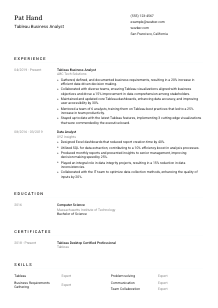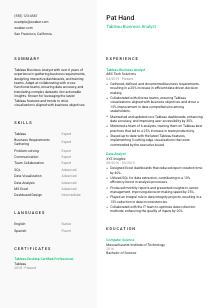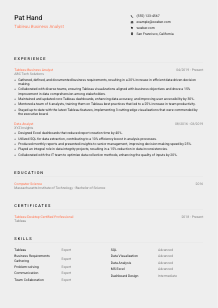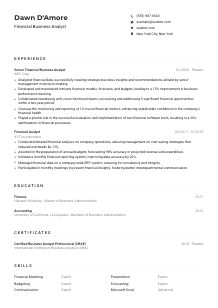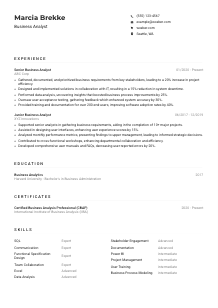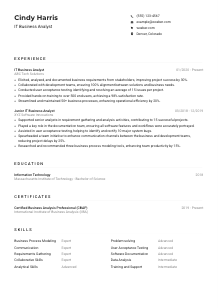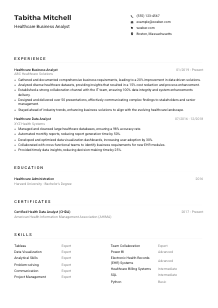Tableau Business Analyst CV Example
Visualizing data, but your CV seems blurry? Focus in on this Tableau Business Analyst CV example, pieced together using Wozber free CV builder. Discover how to align your analytical insights with job criteria, ensuring your career graph always displays a prosperous upward trend!
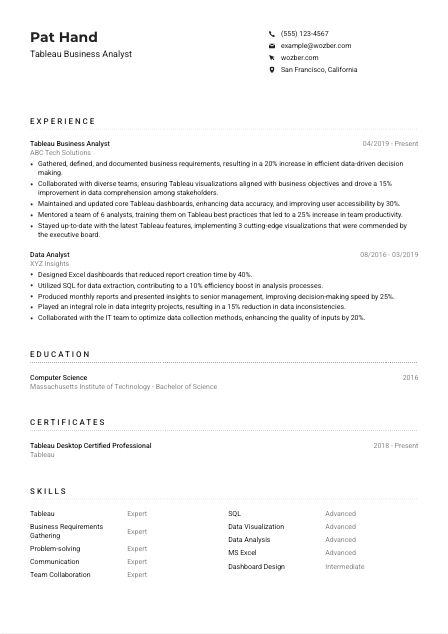
How to write a Tableau Business Analyst CV?
Hello, aspiring Tableau Business Analyst! Preparing to apply for your dream role means building a CV that doesn't just talk but speaks directly to the employer's needs. This tailored guide will walk you through creating a CV that perfectly matches the job description provided, making sure you stand out in the competitive landscape.
Embrace the power of Wozber's free CV builder, ATS-friendly CV templates, and an ATS CV scanner designed to ensure your CV not only meets but exceeds expectations. Let's transform your CV into a compelling story that puts you in the spotlight for your dream job.
Personal Details
The journey to your dream Tableau Business Analyst position starts here, with crafting the perfect introduction on your CV. Let's delve into personalizing this crucial section to immediately capture hiring managers' attention.
1. Brand Yourself Right
Your name is essentially your personal brand. Employ a bit of design strategy using a clear, professional font. Make the font size a tad larger than the rest of your CV — it's about standing out while maintaining professional aesthetics.
2. Job Title Match
Mirror the job title directly under your name. This strategy ties your identity to the role at first glance, communicating instantly that you're a perfect fit. In your case, "Tableau Business Analyst" will perform excellently.
3. The Essential Trio
Your phone number, email, and location are your trio of essentials. Double-check your phone number for accuracy. Use a professional email format, preferably your first and last name. In terms of location, mentioning "San Francisco, California" directly aligns with a key job requirement, showing you're in the right place at the right time.
4. Web Presence
Including a LinkedIn profile can substantially bolster your credibility. Ensure it's updated and harmonizes with your CV's narrative. This gives hiring managers a broader landscape of your professional history and achievements.
5. Privacy Matters
Skip adding any personal details not directly asked for in the job description such as age, marital status, or headshots. It's about focusing purely on professional qualifications and skills.
Takeaway
Think of the Personal Details section as your CV's firm handshake — professional, confident, and making the perfect first impression. Set the tone right, and make it impossible for hiring managers to look away.





Experience
The Experience section is where your CV gets down to business. It's all about proving you're not just a candidate, but the candidate. Let's craft a narrative that translates your past roles into proof of your potential.
- Gathered, defined, and documented business requirements, resulting in a 20% increase in efficient data‑driven decision making.
- Collaborated with diverse teams, ensuring Tableau visualizations aligned with business objectives and drove a 15% improvement in data comprehension among stakeholders.
- Maintained and updated core Tableau dashboards, enhancing data accuracy, and improving user accessibility by 30%.
- Mentored a team of 6 analysts, training them on Tableau best practices that led to a 25% increase in team productivity.
- Stayed up‑to‑date with the latest Tableau features, implementing 3 cutting‑edge visualizations that were commended by the executive board.
- Designed Excel dashboards that reduced report creation time by 40%.
- Utilized SQL for data extraction, contributing to a 10% efficiency boost in analysis processes.
- Produced monthly reports and presented insights to senior management, improving decision‑making speed by 25%.
- Played an integral role in data integrity projects, resulting in a 15% reduction in data inconsistencies.
- Collaborated with the IT team to optimise data collection methods, enhancing the quality of inputs by 20%.
1. Job Description Breakdown
Let's dissect the job description. Highlight responsibilities and skills that align with your personal experience. For a Tableau Business Analyst, key aspects would involve gathering business requirements, document skills, and Tableau dashboard development.
2. Structured Narratives
List your roles in reverse chronological order, emphasizing on responsibilities and achievements that resonate with the Tableau Business Analyst role. Tailoring these bullet points based on job specifications shows a clear and direct correlation between your capabilities and the job requirements.
3. Quantify Your Impact
Quantification makes your accomplishments concrete. For instance, stating that you "enhanced data accuracy and improved user accessibility by 30%" gives a solid testament to your contribution's magnitude.
4. Relevancy is Key
While your stint as a lead in the community play is interesting, prioritize experiences that showcase your aptitude in business analysis and proficiency in Tableau. Every bullet point should assert why you're the top choice for this role.
5. Achievement Highlighting
Showcasing outcomes like "trained a team leading to a 25% increase in productivity" underscores your leadership skills and expertise, directly appealing to the team spirit and collaborative environment emphasized in the job description.
Takeaway
Your experience section is your career storybook, each bullet point a chapter proving your worth. Detail your journey with precision and pride, directly mapping your achievements to the role's demands. Your aim is to make hiring managers nod in approval at every line.
Education
Education lays the groundwork for your career. While straightforward, this section holds the power to reinforce your eligibility, especially for a role as nuanced as a Tableau Business Analyst. Let's maximize its potential.
1. Degree Specification
The job calls for a "Bachelor's degree in Business, Analytics, Computer Science, or a related field." Directly listing your degree, especially if it aligns with these fields, answers a fundamental requirement straight off the bat.
2. Clarity and Structure
Succinctly list your educational background, maintaining clarity. The format should include the degree obtained, the field of study, the educational institution, and graduation year. Precision is key in painting a clear educational picture.
3. Degree Relevance
Highlighting a degree in Computer Science, as mentioned in the CV example, directly aligns with the job's requirement. Tailoring this section to reflect the requested background demonstrates you're not just fitting, but crafted for this role.
4. Pertinent Courses or Achievements
Supplement your degree with relevant courses or achievements when applicable. While our example doesn't necessitate it, showcasing pertinent additional education, like a course in advanced data analytics or Tableau certification, can offer a competitive edge.
5. Additional Feathers
For fresh entrants or those transitioning roles, emphasizing relevant extracurricular activities, honors, or projects can significantly bolster your profile. It demonstrates a proactive approach to learning and applying knowledge within your chosen field.
Takeaway
The education section is where the seeds of your career are showcased. It's not just about what you learned, but about proving you have the sturdy educational foundation that the role demands. Let it reflect the depth of your knowledge and your readiness for the role.
Certificates
In the realm of technology and analytics, certifications play a crucial role in demonstrating ongoing learning and specialization. Let's align the Certificates section with your career aspirations as a Tableau Business Analyst.
1. Filter with Relevance
The job description may not specify required certifications, but including your "Tableau Desktop Certified Professional" credential is directly relevant, showcasing specific expertise and commitment to staying at the forefront of Tableau analytics.
2. Selectivity for Impact
Quality trumps quantity. Highlight certifications that underline your proficiency in crucial areas for the Tableau Business Analyst role. It's about showcasing the best of your professional development that is directly applicable to the job.
3. Date Your Achievements
Including the date, as seen with the "2018 - Present" for the Tableau certification, emphasizes your up-to-date knowledge in the tool. This communicates to hiring managers that you are current with the latest trends and features.
4. Continuous Learning
Professions in technology and business analysis evolve rapidly. Reiterating your commitment to continuous learning through certifications indicates adaptability and dedication to your professional growth, key traits for any successful Tableau Business Analyst.
Takeaway
Your certifications are badges of honor. They tell a tale of dedication, expertise, and a never-ending quest for growth. Flaunt them with pride, ensuring they shine a light on your specific qualifications for the Tableau Business Analyst role.
Skills
The Skills section of your CV is a compact showcase of your professional arsenal. Tailoring this part specifically for the Tableau Business Analyst role can set you apart as a prime candidate. Let's curate a compelling skills portfolio.
1. Job Requirement Mapping
Decipher the job description and extract both the explicit and the hinted-at skills needed for success. Skills like "Tableau proficiency," "SQL," "data visualization," and "problem-solving" are directly aligned with the job's core requirements.
2. Hard and Soft Skills Balance
Integrate both technical (hard) skills and interpersonal (soft) skills. While your expertise in Tableau and data analytics is critical, emphasizing your communication and collaboration skills shows you're ready to thrive in a team environment.
3. Prioritization and Organisation
Prioritize skills that match the job description, positioning them towards the top of your list. It's not about listing everything you know; it's about showcasing the most relevant skills that resonate with the role you're aiming for.
Takeaway
Your skills section is a beacon highlighting your fit for the Tableau Business Analyst role. Carefully select and position each skill to tell a compelling story of why you are not only competent but the best choice for the role.
Languages
In a role that might require clear communication across diverse teams or with international stakeholders, language skills can be quite the asset. Let's navigate through aligning your linguistic capabilities with the Tableau Business Analyst position's demands.
1. Job Description Alignment
Start with the basics: English. Given its mention as a necessity in the job description, ensure your proficiency level is clearly stated. Being "Native" or "Fluent" in English not only meets the criteria but also sets a solid foundation for effective communication.
2. Additional Language Assets
If you speak other languages, list them too. They can be a testament to your ability to work in a global team or handle datasets in multiple languages. This could be particularly appealing if the company operates on an international scale.
3. Proficiency Clarity
Be honest and clear about your proficiency levels for each language listed. This ensures expectations are set right and can help in identifying roles you might take on that involve using these languages.
4. Know Your Role's Scope
Understanding whether your role will have an international touch or if you'll be working with multilingual data can help you highlight your language skills more prominently. They can serve as an additional feather in your cap, demonstrating cultural versatility.
5. Unleashing Global Potential
Even if the job doesn't directly call for additional languages, don't shy away from listing them. It speaks volumes about your personal growth and ability to engage in diverse environments, an invaluable trait in any evolving business landscape.
Takeaway
Language skills are your passport in a connected global market. They can bridge cultures and facilitate smoother interactions across borders. Highlighting these skills intelligently can subtly boost your value as a prospective Tableau Business Analyst.
Summary
The Summary section is your CV's opening act, setting the stage for everything that follows. It's where you grab attention and build interest. Crafting a captivating summary especially for a Tableau Business Analyst role means striking a delicate balance between being informative and engaging.
1. Capture the Role's Essence
Digest the job's requirements and let them inform the tone of your summary. As a Tableau Business Analyst, blend your analytics prowess with business acumen, hinting at your ability to transform data into actionable insights.
2. Kickstart with a Bang
Begin with a confident introduction that encapsulates your professional identity. For instance, start with your years of experience and primary expertise areas, establishing right away why you're a top contender for the role.
3. Pinpoint Key Skills and Achievements
Zero in on a few key skills and notable accomplishments that align with the job and company objectives. Showing how you've applied your skills in real-world scenarios speaks louder than a simple list of competencies.
4. Brevity and Power
Keep it succinct yet impactful. This isn't the place for the minutiae of your career; it's a highlight reel designed to intrigue and invite further reading. Craft each sentence to push the narrative of you as the ideal candidate.
Takeaway
Think of your summary as the hook of your CV. Done right, it piques interest and invites hiring managers to dive deeper into the narrative of your professional journey. Make it resonate, ensuring it reflects the breadth and depth of your expertise as a Tableau Business Analyst.
Embarking on Your Tableau Business Analyst Career Path
You're now armed with the knowledge needed to craft a CV that stands out, precisely aimed at the Tableau Business Analyst role. Remember, a CV is more than a document — it's a narrative of your professional journey. Using Wozber's free CV builder and ATS CV scanner, you're equipped to fine-tune this narrative to perfection, ensuring your CV is ATS-compliant and ready to make a lasting impression. Embrace the journey ahead with confidence, backed by a CV that eloquently tells your story and opens doors to new opportunities.
The role you've been dreaming of is just around the corner. Go for it with gusto!

- Bachelor's degree in Business, Analytics, Computer Science, or a related field.
- Minimum of 3 years of experience as a Business Analyst, with proficiency in Tableau.
- Strong analytical and problem-solving skills with the ability to understand complex data sets and translate them into actionable insights.
- Experience working with SQL and data visualization tools other than Tableau is a plus.
- Effective communication and collaboration skills to work with multidisciplinary teams and present findings to stakeholders.
- Strong English communication skills needed.
- Must be located in San Francisco, CA.
- Gather, define, and document business requirements and translate them into Tableau dashboards and reports.
- Collaborate with cross-functional teams to understand and analyze data needs, ensuring that Tableau visualizations align with business objectives.
- Maintain and update existing Tableau dashboards, ensuring data accuracy and consistency.
- Train and mentor other team members on Tableau best practices and data visualization techniques.
- Stay updated with the latest Tableau features, trends, and industry standards to ensure optimal performance of visualizations.





